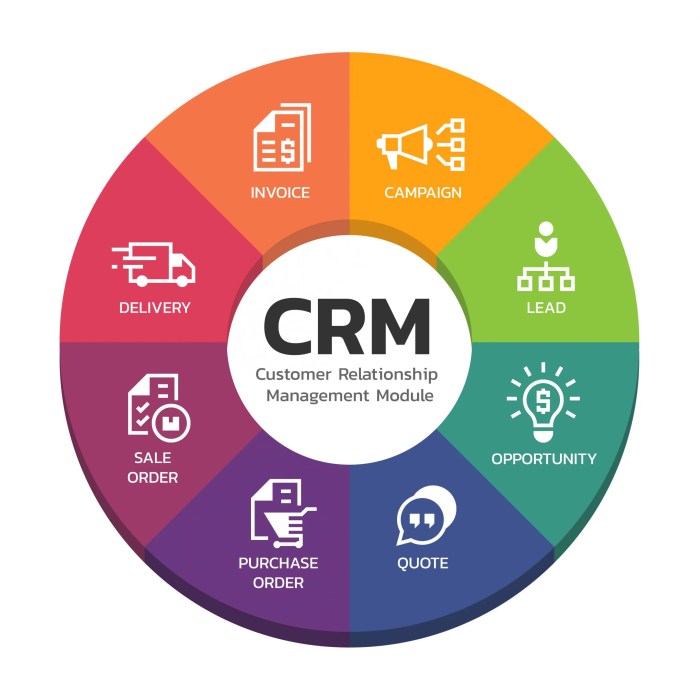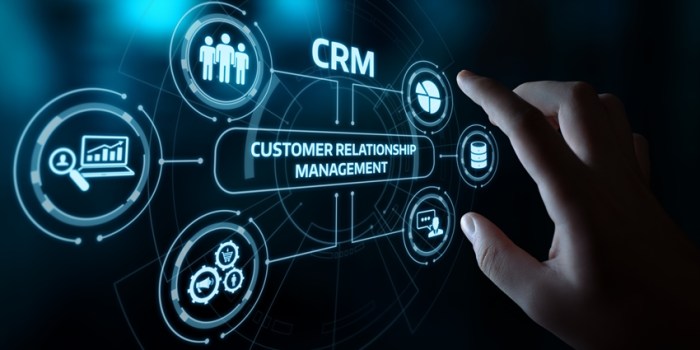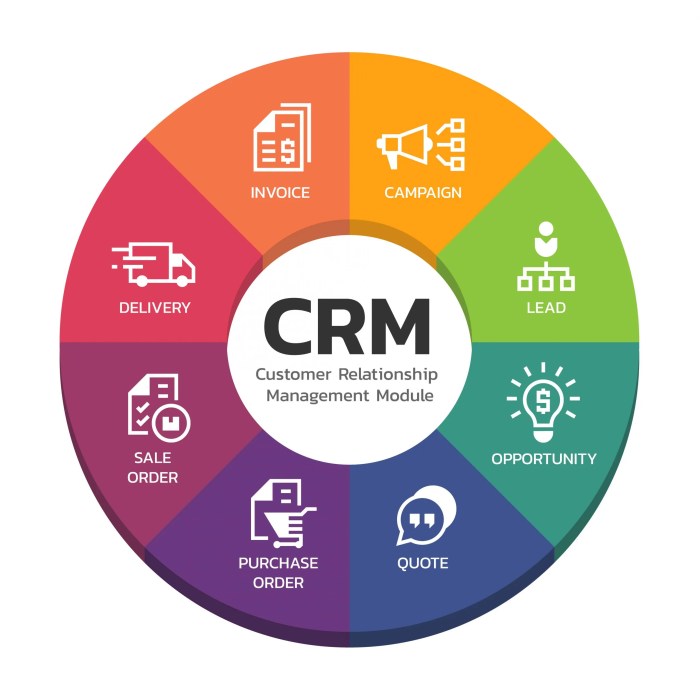CRM for Service-Based Businesses Boosting Customer Relationships
CRM for Service-Based Businesses is more than just a buzzword; it’s a powerful tool for transforming how you manage your client relationships. Imagine a system that streamlines communication, automates tasks, and empowers your team to deliver personalized service experiences. This is the promise of CRM, and for service-based businesses, it can be the key to unlocking higher customer satisfaction, increased revenue, and sustainable growth.
In a competitive landscape where customer loyalty is paramount, CRM systems provide a comprehensive framework for understanding your clients, anticipating their needs, and building lasting relationships. By centralizing client data, automating tasks, and offering insightful analytics, CRM helps you manage your service delivery with efficiency and precision, ensuring every client feels valued and supported.
The Importance of CRM for Service-Based Businesses
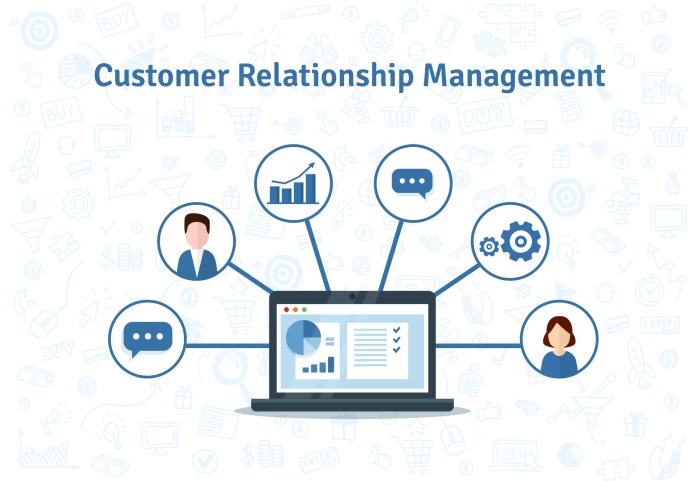
In the competitive landscape of service-based businesses, managing client relationships effectively is paramount to success. A robust Customer Relationship Management (CRM) system is not just a luxury but a necessity for organizations seeking to thrive in this dynamic environment. CRM empowers service-based businesses to streamline operations, enhance customer satisfaction, and foster lasting loyalty.
Benefits of CRM for Service-Based Businesses
A well-implemented CRM system offers numerous benefits for service-based businesses. It centralizes customer data, providing a comprehensive view of each client’s interactions, preferences, and history. This allows businesses to personalize their services, anticipate customer needs, and deliver tailored experiences.
- Enhanced Customer Satisfaction: CRM systems facilitate personalized communication and service delivery, leading to increased customer satisfaction. By understanding customer preferences and needs, businesses can tailor their services to meet individual requirements. For example, a fitness center using a CRM can personalize workout routines based on client goals and fitness levels. This individualized approach enhances the overall customer experience and fosters a sense of value.
- Improved Client Retention: CRM systems enable businesses to track customer interactions and identify potential churn risks. By proactively addressing concerns and providing exceptional support, businesses can retain clients and minimize customer attrition. A CRM system can identify clients who haven’t engaged in a while and send personalized outreach campaigns to re-engage them.
- Streamlined Operations: CRM systems streamline operational processes by automating tasks such as scheduling appointments, managing service requests, and tracking progress. This frees up staff to focus on more strategic initiatives and improve overall efficiency. For example, a consulting firm can use a CRM to manage client projects, track deadlines, and assign tasks to team members, improving project management and team collaboration.
- Data-Driven Decision Making: CRM systems provide valuable insights into customer behavior and preferences. This data can be used to make informed decisions about marketing campaigns, service offerings, and pricing strategies. By analyzing customer data, a marketing agency can identify successful campaigns and optimize future strategies.
Challenges Faced by Service-Based Businesses
Service-based businesses face unique challenges that CRM can address. These challenges often stem from the intangible nature of services and the importance of building strong client relationships.
- Managing Customer Expectations: Service-based businesses must effectively manage customer expectations. CRM systems provide a platform to clearly communicate service details, timelines, and deliverables, reducing misunderstandings and ensuring customer satisfaction. A CRM system can store service descriptions, terms and conditions, and FAQs, ensuring consistent communication and transparency.
- Tracking Service Delivery: It is essential to track service delivery and ensure that clients receive the promised services. CRM systems allow businesses to monitor service progress, track performance metrics, and identify areas for improvement. A service provider can use a CRM to track service calls, measure response times, and monitor customer satisfaction levels.
- Building Lasting Relationships: Building lasting relationships with clients is crucial for long-term success in service-based businesses. CRM systems facilitate ongoing communication, personalized interactions, and targeted outreach, fostering stronger client relationships. A CRM system can automate personalized birthday greetings, anniversary messages, and follow-up emails, reinforcing client relationships.
Key Features of CRM for Service-Based Businesses
A CRM system tailored for service-based businesses must have specific features that cater to the unique needs of service providers. These features streamline operations, improve client relationships, and ultimately enhance service delivery.
Service Scheduling and Task Management
Service scheduling and task management are crucial for service providers. They allow for efficient organization of appointments, tasks, and workflows. A robust CRM system should offer features like:
- Appointment Scheduling: This feature allows service providers to schedule appointments with clients, set reminders, and manage appointment availability. This simplifies the process of booking and coordinating services, minimizing scheduling conflicts and ensuring efficient resource allocation.
- Task Management: Task management tools within the CRM system help service providers track tasks associated with each client or project. This includes assigning tasks to team members, setting deadlines, and monitoring progress. Task management ensures that all necessary steps are taken to deliver the service effectively.
- Workflow Automation: Workflow automation streamlines repetitive tasks, saving time and reducing errors. For example, automating appointment reminders or follow-up emails after service completion can improve customer satisfaction and reduce manual effort.
Communication Tools
Effective communication is essential for building strong client relationships. A CRM system should offer a range of communication tools to facilitate seamless interactions:
- Integrated Email and Messaging: The ability to send emails and messages directly from the CRM system allows for efficient communication with clients. This can include sending appointment confirmations, service updates, or simply checking in with clients.
- Live Chat: Live chat features enable real-time communication with clients, addressing queries and concerns instantly. This can enhance customer satisfaction and provide immediate support.
- Call Logging and Management: Call logging and management features allow service providers to track all calls with clients, including call details, notes, and outcomes. This provides valuable insights into client interactions and can help identify areas for improvement.
Reporting and Analytics
Reporting and analytics are essential for understanding business performance and identifying areas for improvement. A CRM system should provide:
- Client Segmentation: The ability to segment clients based on various criteria, such as demographics, service history, or purchase behavior, allows service providers to tailor marketing efforts and service offerings to specific client groups.
- Service Performance Metrics: Tracking metrics like service completion rates, customer satisfaction scores, and average service time provides valuable insights into the effectiveness of service delivery. This data can be used to identify areas for improvement and optimize service processes.
- Financial Reporting: Financial reporting features allow service providers to track revenue, expenses, and profitability. This helps in understanding the financial health of the business and making informed decisions.
Benefits of Implementing CRM for Service-Based Businesses
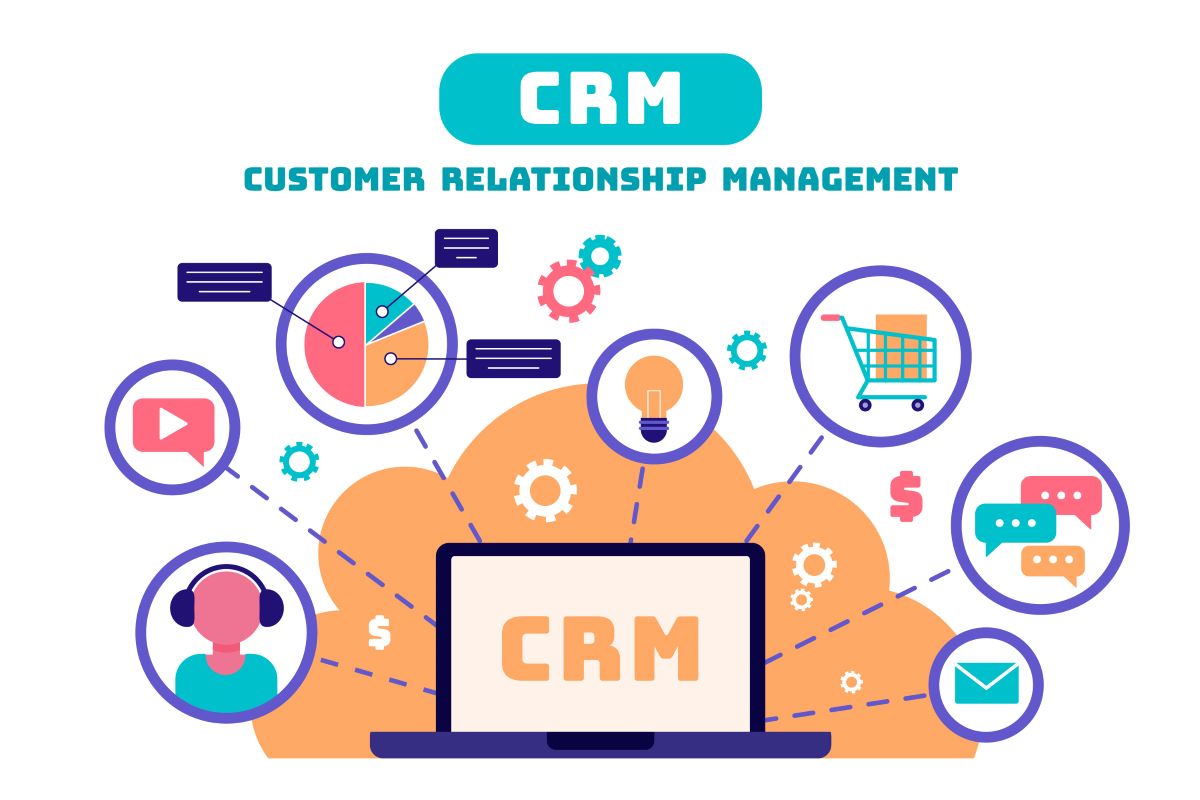
Implementing a CRM system can significantly enhance the efficiency and effectiveness of service-based businesses. CRM helps streamline service processes, improve customer relationships, and ultimately drive revenue growth.
Improved Customer Retention
CRM systems offer a powerful platform for building strong customer relationships. By centralizing customer data, CRM provides a comprehensive view of customer interactions, preferences, and history. This enables service teams to provide personalized and proactive support, fostering loyalty and increasing customer retention.
- Targeted Communication: CRM allows businesses to segment customers based on demographics, purchase history, and engagement levels. This enables targeted communication through personalized emails, newsletters, and promotions, enhancing customer engagement and satisfaction.
- Proactive Support: CRM can automate follow-up communications, reminders, and service updates. This proactive approach ensures timely support and addresses customer concerns before they escalate, minimizing churn and enhancing customer satisfaction.
- Customer Feedback Analysis: CRM systems often include tools for collecting and analyzing customer feedback. This valuable insight allows businesses to identify areas for improvement, address customer pain points, and enhance service delivery.
Increased Revenue
By streamlining operations and enhancing customer satisfaction, CRM systems directly contribute to increased revenue for service-based businesses.
- Cross-Selling and Upselling Opportunities: CRM provides a comprehensive view of customer needs and preferences. This enables service teams to identify cross-selling and upselling opportunities, maximizing revenue from existing customers.
- Improved Service Efficiency: By automating tasks and streamlining workflows, CRM reduces administrative overhead and allows service teams to focus on delivering high-quality service. This increased efficiency translates to higher productivity and revenue generation.
- Enhanced Customer Lifetime Value: By building strong customer relationships and providing exceptional service, CRM increases customer lifetime value. This leads to sustained revenue growth and long-term business success.
Enhanced Operational Efficiency
CRM systems streamline service processes, automate tasks, and provide real-time insights into operations, significantly enhancing operational efficiency.
- Automated Workflows: CRM automates repetitive tasks such as scheduling appointments, sending reminders, and generating reports. This frees up service teams to focus on high-value activities and improves overall productivity.
- Centralized Data Management: CRM centralizes customer data, eliminating the need for multiple spreadsheets and databases. This simplifies data management, reduces errors, and ensures consistent access to information across the organization.
- Real-Time Performance Monitoring: CRM provides real-time insights into service performance metrics, such as response times, customer satisfaction ratings, and service delivery efficiency. This enables businesses to identify bottlenecks, optimize processes, and improve overall operational performance.
Empowering Service Teams
CRM empowers service teams with the tools and information they need to deliver exceptional customer experiences.
- Personalized Service: CRM provides a comprehensive view of customer history, preferences, and interactions. This allows service teams to personalize their approach, tailoring communication and service delivery to individual customer needs.
- Knowledge Management: CRM systems often include knowledge bases and FAQs that provide service teams with quick access to information and solutions. This enables them to resolve customer issues efficiently and effectively.
- Improved Collaboration: CRM facilitates collaboration among service teams, ensuring seamless communication and knowledge sharing. This promotes efficient problem-solving and improves overall service quality.
Choosing the Right CRM for Your Service Business
Selecting the right CRM for your service business is crucial for streamlining operations, enhancing customer relationships, and driving growth. A well-chosen CRM system can automate tasks, improve communication, and provide valuable insights into your customers’ needs.
Factors to Consider When Selecting a CRM, CRM for Service-Based Businesses
When evaluating CRM options, several key factors should be considered to ensure a good fit for your specific business needs. These include:
- Industry-Specific Features: Different industries have unique requirements. Look for a CRM with features tailored to your industry, such as appointment scheduling for service businesses or project management tools for consulting firms.
- Integration Capabilities: A CRM should seamlessly integrate with your existing tools, such as accounting software, email marketing platforms, and communication channels. This integration ensures data synchronization and avoids manual data entry.
- Budget Constraints: CRM solutions come in various price ranges. Determine your budget and choose a CRM that offers the features you need without breaking the bank. Consider both the initial cost and ongoing subscription fees.
- Scalability: As your business grows, your CRM should be able to scale with you. Look for a solution that can handle increasing customer data and user activity without compromising performance.
- Ease of Use: A user-friendly interface is essential for widespread adoption within your organization. Choose a CRM that is intuitive and easy to navigate for both your sales and customer service teams.
- Customer Support: Reliable customer support is crucial for troubleshooting issues and getting the most out of your CRM. Look for a provider with responsive support channels and comprehensive documentation.
Popular CRM Platforms for Service-Based Businesses
Several CRM platforms are popular among service-based businesses, each offering a unique set of features and benefits. Here are some of the most widely used options:
- Zoho CRM: Zoho CRM is a comprehensive solution that offers a wide range of features, including sales automation, marketing automation, customer support, and project management. It is known for its affordability and extensive integrations.
- Salesforce: Salesforce is a leading CRM platform with a strong reputation for its robust features and scalability. It is suitable for businesses of all sizes and offers a wide range of customization options.
- HubSpot: HubSpot is a popular CRM platform that combines sales, marketing, and customer service functionalities. It is known for its user-friendly interface and focus on inbound marketing strategies.
- Pipedrive: Pipedrive is a sales-focused CRM that helps businesses manage their sales pipelines and track deals effectively. It is known for its intuitive interface and powerful reporting capabilities.
- Freshworks: Freshworks is a cloud-based CRM platform that offers a range of solutions for sales, marketing, and customer support. It is known for its affordability and ease of use.
Evaluating CRM Options
When evaluating CRM options, it is important to consider the following factors:
- Functionality: Does the CRM offer the features you need to manage your sales, marketing, and customer service operations effectively?
- User Interface: Is the CRM user-friendly and easy to navigate for your team?
- Integrations: Does the CRM integrate with your existing tools and systems?
- Scalability: Can the CRM handle your business’s future growth?
- Pricing: Is the CRM within your budget?
- Customer Support: Does the provider offer reliable customer support?
- Security: Does the CRM have robust security measures to protect your data?
- Mobile Accessibility: Is the CRM accessible on mobile devices?
- Reporting and Analytics: Does the CRM provide insightful reports and analytics to track your progress?
Implementing and Using CRM Effectively
Implementing a CRM system is not just about choosing the right software. It’s about integrating it into your business processes and using it effectively to achieve your goals. This involves careful planning, training, and ongoing optimization.
Step-by-Step Guide for Implementing a CRM System
Implementing a CRM system effectively requires a structured approach. Here’s a step-by-step guide:
- Define Your Goals and Requirements: Clearly define your business objectives for using CRM. What do you want to achieve? Are you looking to improve customer retention, streamline sales processes, or gain a deeper understanding of customer behavior? These objectives will guide your CRM selection and implementation.
- Choose the Right CRM System: Select a CRM system that aligns with your business needs and budget. Consider factors like ease of use, features, integrations, and scalability. It’s crucial to involve key stakeholders from different departments in the decision-making process.
- Data Migration and Cleaning: Migrate your existing customer data to the new CRM system. Ensure data accuracy and consistency. This may involve data cleaning and deduplication to avoid errors and inconsistencies.
- Configure and Customize: Configure the CRM system to match your business processes and workflows. This includes setting up custom fields, defining roles and permissions, and creating automation rules.
- Train Your Team: Provide comprehensive training to your team on how to use the CRM system effectively. Focus on key features, best practices, and troubleshooting. Regular refresher training is essential to keep everyone up-to-date.
- Launch and Monitor: Start using the CRM system and monitor its performance closely. Track key metrics like customer engagement, sales conversion rates, and support response times. Identify areas for improvement and make adjustments as needed.
- Continuously Improve: CRM implementation is an ongoing process. Regularly review and optimize your CRM system to ensure it’s meeting your evolving business needs. This includes adding new features, integrating with other tools, and refining workflows.
Best Practices for Maximizing CRM Effectiveness
To ensure your CRM system delivers maximum value, follow these best practices:
- Data Accuracy and Completeness: Accurate and complete customer data is essential for effective CRM. Encourage your team to enter accurate information and update customer records regularly. Implement data validation rules to minimize errors.
- Segmentation and Targeting: Segment your customer base based on demographics, purchase history, or engagement levels. This allows you to target specific customer groups with tailored marketing messages and offers.
- Automation: Automate repetitive tasks such as sending email campaigns, scheduling appointments, and generating reports. This frees up your team to focus on more strategic activities.
- Communication and Collaboration: Use CRM features to improve communication and collaboration within your team. Share customer information, track progress on projects, and ensure everyone is on the same page.
- Customer Engagement: Use CRM to enhance customer engagement. Track customer interactions, provide personalized experiences, and offer proactive support. Use features like live chat, social media integration, and automated surveys to connect with your customers in real-time.
- Regular Review and Optimization: Regularly review your CRM system and make adjustments to ensure it’s meeting your business needs. Track key metrics, gather feedback from your team, and identify areas for improvement.
Leveraging CRM Features for Automation, Communication, and Engagement
CRM systems offer a wide range of features that can automate tasks, improve communication, and enhance customer engagement. Here are some examples:
- Automated Email Marketing: Send targeted email campaigns based on customer behavior and preferences. Use features like email segmentation, personalization, and automated follow-up sequences to increase engagement and conversion rates.
- Appointment Scheduling: Automate appointment scheduling and reminders. Integrate your CRM with your calendar system to streamline the process and reduce no-shows.
- Live Chat: Provide instant customer support through live chat on your website. This allows you to answer questions, resolve issues, and improve customer satisfaction.
- Social Media Integration: Connect your CRM with your social media accounts to track mentions, respond to inquiries, and manage your social media presence.
- Customer Support Ticketing System: Use a ticketing system to track customer support requests, assign them to agents, and monitor resolution times. This helps to ensure timely and efficient support.
- Reporting and Analytics: Generate detailed reports on customer behavior, sales performance, and marketing campaign effectiveness. Use these insights to make data-driven decisions and improve your business processes.
CRM for Specific Service Industries
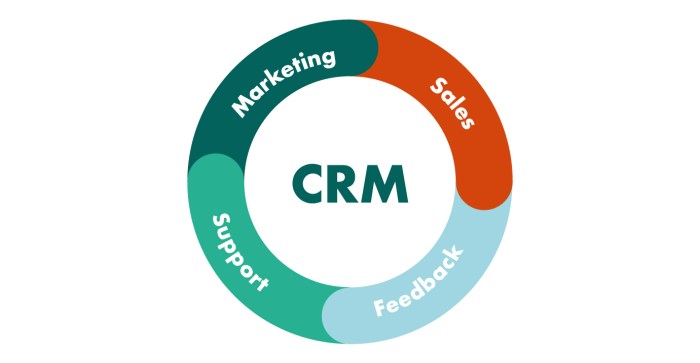
CRM is not a one-size-fits-all solution. Different service industries have unique needs and challenges that require tailored CRM systems. Understanding how CRM is used in various service industries can help businesses make informed decisions about implementing a CRM solution.
Healthcare
CRM systems in healthcare can be used to manage patient relationships, improve patient satisfaction, and streamline operations.
- Patient Relationship Management: Healthcare providers can use CRM to track patient demographics, medical history, appointments, and medications. This information can be used to personalize communication, provide better care, and improve patient engagement.
- Appointment Scheduling: CRM systems can help healthcare providers schedule appointments, send reminders, and manage cancellations. This can reduce no-shows and improve efficiency.
- Patient Feedback and Surveys: CRM can be used to collect patient feedback through surveys and reviews. This data can be used to identify areas for improvement and enhance the patient experience.
Education
Educational institutions can leverage CRM to manage student relationships, improve student engagement, and streamline administrative tasks.
- Student Relationship Management: CRM can help track student demographics, academic performance, and extracurricular activities. This information can be used to personalize communication, provide targeted support, and improve student success.
- Admissions Management: CRM systems can be used to manage the admissions process, track applications, and communicate with prospective students. This can improve efficiency and increase enrollment rates.
- Alumni Engagement: CRM can help educational institutions stay connected with alumni, cultivate relationships, and foster a sense of community.
Hospitality
Hospitality businesses can use CRM to enhance guest experiences, improve customer loyalty, and manage operations more effectively.
- Guest Relationship Management: CRM systems can be used to track guest preferences, booking history, and special requests. This information can be used to personalize communication, provide tailored services, and improve guest satisfaction.
- Loyalty Programs: CRM can help hospitality businesses create and manage loyalty programs, rewarding repeat customers and encouraging them to return.
- Reservation Management: CRM systems can help manage reservations, track availability, and streamline the check-in and check-out processes.
From scheduling appointments and managing tasks to analyzing customer data and personalizing communication, CRM for service-based businesses empowers you to deliver exceptional service experiences that drive customer satisfaction and loyalty. By embracing CRM, you can streamline operations, optimize service delivery, and cultivate long-term relationships with your clients, ultimately leading to greater business success.
FAQs
What are some examples of CRM systems specifically designed for service-based businesses?
Popular CRM platforms tailored for service businesses include Salesforce Service Cloud, Zoho CRM, HubSpot CRM, and Freshworks CRM. These platforms offer features like service scheduling, task management, communication tools, and reporting, making them ideal for managing client relationships and optimizing service delivery.
How can I integrate CRM with my existing business software?
Many CRM systems offer robust integration capabilities with popular business software like accounting platforms, email marketing tools, and appointment scheduling apps. This seamless integration streamlines your workflows, eliminates data silos, and ensures a cohesive experience for your team.
What are the costs associated with implementing a CRM system?
The cost of CRM systems can vary depending on the chosen platform, the number of users, and the features required. Some CRM providers offer free plans for smaller businesses, while others offer tiered pricing based on your needs. It’s important to research and compare different options to find the best fit for your budget and requirements.
